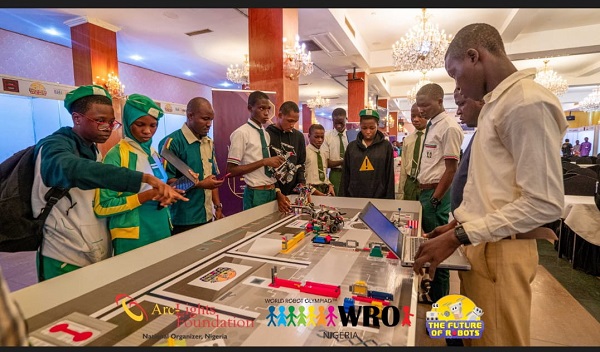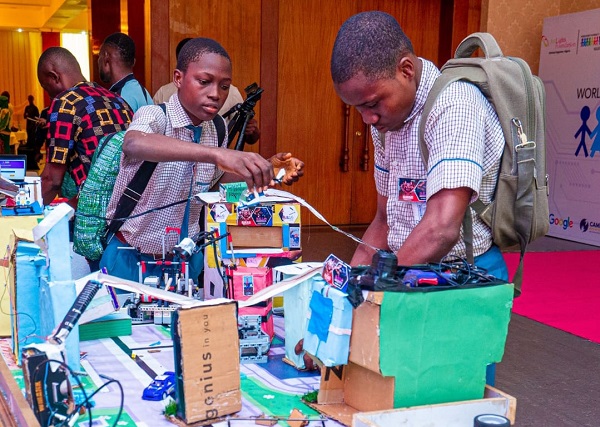In a compelling plea today at the World Robot Olympiad (WRO) Nigeria National Competition, Arclight Foundation CEO Abisola Obasanya urged the federal government to swiftly enact and enforce Nigeria’s pending technology-in-education policy, warning that without decisive leadership, the nation risks falling behind in the global race for digital expertise.
Table of Contents

A Stage Set for Future Innovators
Held under the stirring theme “The Future of Robots,” the WRO Nigeria National Competition convened innovators, educational policymakers, and government officials at a bustling Lagos venue. The event, which culminated in an exhibition of student-led robotics projects, symbolised both the country’s potential and the urgency of policy inaction. Obasanya, speaking to a packed hall, portrayed the competition not merely as a display of ingenuity but as a microcosm of Nigeria’s capability to engineer global solutions through homegrown talent.
“Robotics education is not an extra‑curricular activity; it is a powerful tool for national development,” Obasanya remarked, reaffirming the Foundation’s mission to train a generation that thinks innovatively, works collaboratively, and competes on the global stage.
From Aspiration to Scholarship
Citing real‑world outcomes, Obasanya detailed how Arclight-backed students, through participating in international robotics contests, have gained scholarships and broadened their ambitions, transforming extracurricular participation into tangible educational opportunity. Yet, she lamented that these success stories remain droplet events in a desert of systemic inaction, urging that the challenge lies not in vision or resources, but in the application of policy.
“Nigeria doesn’t lack strategy—what we lack is execution,” she asserted.
A Foundation with a Plan
Since its founding in 2011, Arclight Foundation has championed STEM education and robotics integration in Nigerian classrooms. Its impact-driven model unfolds through four interlinked centres:
- Technology Centre: Coordinates the WRO and offers hands-on STEM training.
- A‑Learn Teachers’ Centre: Aims to upskill 25,000 teachers nationwide on robotics and digital content.
- Research & Advocacy Hub: Develops policy briefs and consults with government entities.
- School Transformation Unit: Coaches schools in adopting safe, student-focused, tech-friendly environments.
Obasanya stressed that teacher training and infrastructure upgrades should be prioritised equally alongside the introduction of robotics curricula—an approach the Foundation has steadily rolled out from bottom-up across local schools.
The Wider Industry Voice
Echoing Obasanya’s urgency, Olusola Ayoola, founder of Robotics and Artificial Intelligence Nigeria (RAIN), delivered a keynote that framed the debate in national terms: Nigeria’s future, he warned, will be shaped by how effectively its education system equips learners to create and problem-solve for tomorrow’s world.
Stakes for National Development
Current government efforts—such as a recent policy granting free tuition, boarding, and stipends of ₦45,000 to technical college students—demonstrate political momentum for vocational education-based reform. But Obasanya argued that without a unifying framework that integrates robotics and digital skills into national curriculum, teacher training, and infrastructure plans, these piecemeal initiatives could fail to scale or endure.
Indeed, while free technical education is welcomed by many, it also sparked intense debate about fairness and sustainability among stakeholders. A more coherent roadmap—one that ensures inclusivity and long-term structural uplift—is essential.

From Advocacy to Action
Obasanya appealed to government officials: invest in scalable solutions; empower teachers; update archaic curricula; and transform school environments. She encouraged decision-makers to regard robotics and AI education not as optional, but as core pillars for nurturing adaptable problem solvers with global competence.
“That would make Nigeria solution-driven,” she affirmed, “with local innovators who can excel internationally.”
Why It Matters
The importance of early tech immersion is echoed not just in practice, but in global research: successful integration of educational technology hinges on continuous teacher training, modern infrastructure, and relevant content—a lesson drawn from studies such as the 2024 U.S. National Education Technology Plan.
Nigeria has partially embraced this path with national initiatives like the 3‑Million Technical Talent (3MTT) programme, launched in October 2023. It aims to upskill three million Nigerians across AI, cloud computing, cybersecurity, and other key tech areas by 2027. Yet, such nationally coordinated efforts need to be reinforced by policy-driven education reform to reach deep into school systems.
Building a National Tech‑Education Ecosystem
By uniting grassroots efforts like those of Arclight and RAIN with federal programmes like 3MTT, Nigeria can build a comprehensive ecosystem rooted in tech‑enabled teaching. The Foundation’s recommendation is clear:
- Embed digital literacy and robotics into the national curriculum.
- Prioritise continuous, scalable teacher development via centres like A‑Learn.
- Expand infrastructure—from rural labs to digital resources.
- Ensure equitable access across regions and social groups.
A Call to Policymakers
Arclight’s appeal is timely. As Nigeria pursues vocational reforms and technical tuition expansions, these initiatives could stagnate without underlying systemic support. Obasanya’s demand is specific: act now on tech education policy, or risk relegating Nigeria’s youth to an outdated educational model.

Looking Ahead
Obasanya concluded with an optimistic vision: a future where Nigeria is not only literate in technology but also authoritative in digital innovation. “We’re in a critical window,” she said. “If the government acts now, these students could drive national transformation. Delay, and we squander the opportunity.”
As the WRO awards concluded, carrying with them both medals and bold proposals, it became clear: the events of today could define tomorrow’s workforce—if the government turns intention into implementation.
Join Our Social Media Channels:
WhatsApp: NaijaEyes
Facebook: NaijaEyes
Twitter: NaijaEyes
Instagram: NaijaEyes
TikTok: NaijaEyes
READ THE LATEST EDUCATION NEWS















![Tragic Incident: Fans of Seyi Vibez Die in Fatal Accident After Electrifying Lagos Concert [VIDEO] Seyi Vibez](https://naijaeyesblog.com/wp-content/uploads/2025/08/Seyi-Vibez-180x135.avif)























